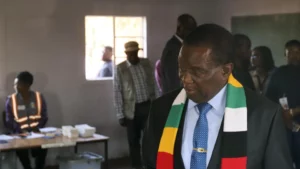Zimbabwean President Emmerson Mnangagwa, 80 years old, was reelected for a second term on Saturday following a flawed election, the results of which were immediately rejected by the party of his main rival.
Zimbabwean President Emmerson Mnangagwa retains the presidential seat. At 80 years old, the incumbent head of state was reelected on Saturday, August 26, for a second term following a flawed election, the results of which were immediately rejected by the party of his main rival.

Mnangagwa obtained 52.6% of the votes cast, while Nelson Chamisa, the leader of the main opposition party, the Coalition of Citizens for Change (CCC), received 44%, announced the electoral commission late in the evening.
“Mnangagwa Emmerson Dambudzo of the Zanu-PF party is declared President of the Republic of Zimbabwe,” proclaimed the commission’s chairperson, Justice Chigumba.
“Fraud” and “obstacles”
Zimbabweans went to the polls on Wednesday and Thursday to choose their president and members of parliament. Nearly 69% of registered voters participated in the election.
The election, which was supposed to conclude on Wednesday evening, had to be extended for an additional day. Confusion, including a shortage of ballots in polling stations, occurred particularly in the capital city of Harare, an opposition stronghold.
The CCC, which had already denounced “fraud” and “obstacles” during the vote, rejected the results.
“We have not endorsed the results because they are distorted. The electoral and pre-electoral context was not favorable, especially for us,” said Promise Mkwananzi, spokesperson for the party, to AFP.
“We cannot accept the results,” he affirmed. The electoral commission acknowledged that less than a quarter of polling stations in Harare opened on time on Wednesday.
The opposition relied on a desire for change fueled by rampant corruption and shortages of fuel, bread, and medicine in an economy that has been in decline for about twenty years.
Doubts from observers
Observers from the European Union, the Southern African Development Community (SADC), and Commonwealth countries unanimously expressed doubts this week about the smooth conduct of the electoral process.
They highlighted “serious problems” that marred the “regularity” and “transparency” of the election, as well as the violation of “numerous international standards” governing democratic elections.
Some voters were missing from the voter rolls, while others were subjected to intimidation in polling stations.
Observers also noted the authorities’ refusal to accredit certain foreign media outlets and questioned the impartiality of local public media.
Nevertheless, the vote took place in a “calm and peaceful” environment, they noted.
The election campaign in Zimbabwe, which had been tightly controlled by liberation hero Robert Mugabe, who was ousted in 2017 in a coup, was marked by a harsh crackdown on the opposition.
A “seriously flawed electoral process”
The CCC denounced the banning of dozens of rallies and the arrests of opposition members, including individuals attending private gatherings, in a country already burdened by a long history of elections marred by irregularities.
Prior to the election, Human Rights Watch had already criticized a “seriously flawed electoral process.”
“The elections were marred by irregularities, and the aggrieved Zimbabweans as well as the Coalition of Citizens for Change have a strong basis to seek justice,” said political expert Rejoice Ngwenya, interviewed by AFP.
In 2018, Mnangagwa, Mugabe’s successor, was narrowly elected with 50.8% of the vote. Two days after the election, the army fired on protesters, resulting in six deaths. Chamisa, who was already his opponent at the time, contested the result before being dismissed by the courts.
The Zanu-PF party also won a majority in Parliament, obtaining 136 out of the 210 seats directly allocated by voters, compared to 73 for the CCC. Sixty seats are yet to be allocated according to a proportional system.
With AFP